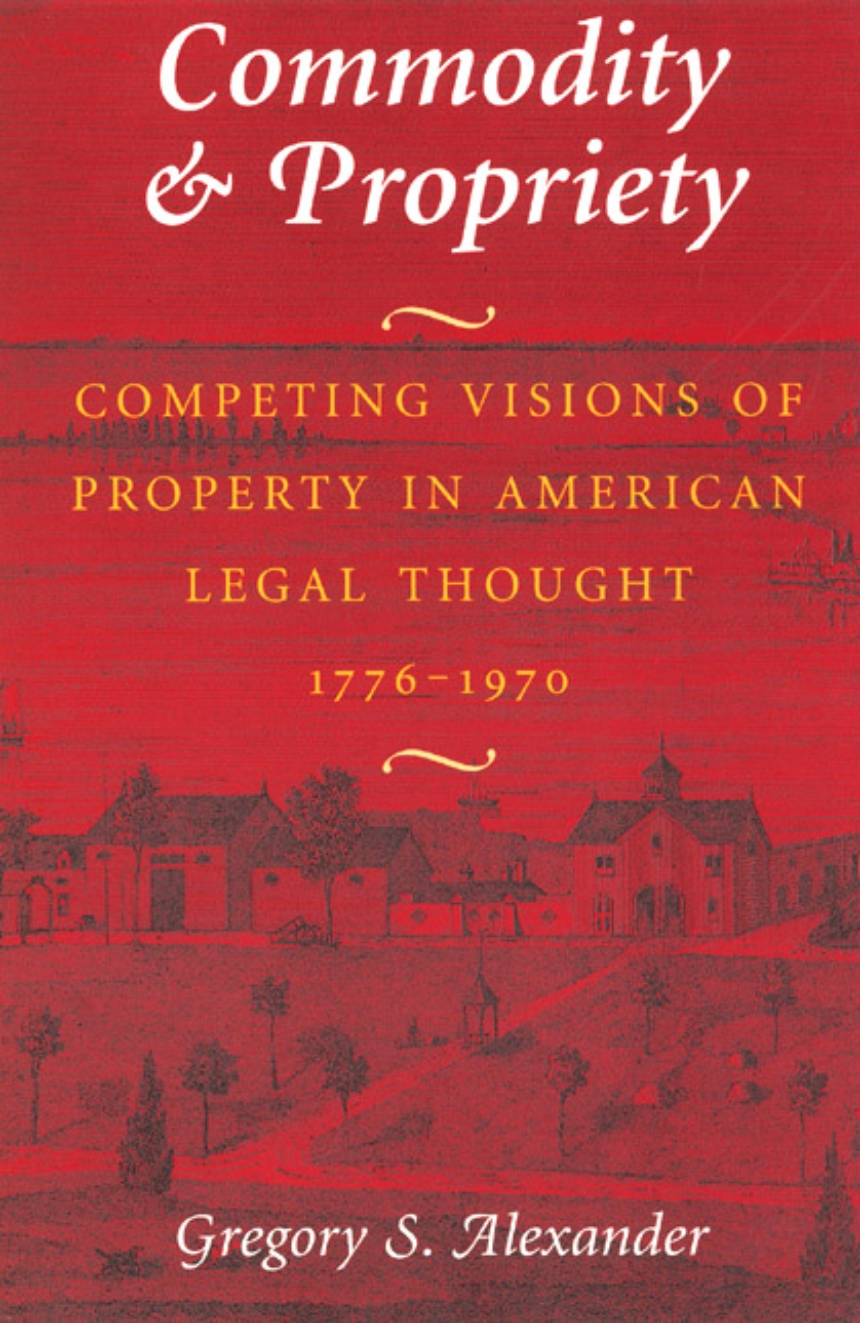Commodity & Propriety
Competing Visions of Property in American Legal Thought, 1776-1970
9780226013541
9780226013534
9780226013527
Commodity & Propriety
Competing Visions of Property in American Legal Thought, 1776-1970
Most people understand property as something that is owned, a means of creating individual wealth. But in Commodity and Propriety, the first full-length history of the meaning of property, Gregory Alexander uncovers in American legal writing a competing vision of property that has existed alongside the traditional conception. Property, Alexander argues, has also been understood as proprietary, a mechanism for creating and maintaining a properly ordered society. This view of property has even operated in periods—such as the second half of the nineteenth century—when market forces seemed to dominate social and legal relationships.
In demonstrating how the understanding of property as a private basis for the public good has competed with the better-known market-oriented conception, Alexander radically rewrites the history of property, with significant implications for current political debates and recent Supreme Court decisions.
In demonstrating how the understanding of property as a private basis for the public good has competed with the better-known market-oriented conception, Alexander radically rewrites the history of property, with significant implications for current political debates and recent Supreme Court decisions.
Table of Contents
Acknowledgments
Introduction
Pt. 1: The Civic Republican Culture, 1776-1800
Prologue: Legal Writing in the Civic Republican Era
1: Thomas Jefferson and the Civic Conception of Property
2: Time, History, and Property in the Republican Vision
3: Descent and Dissent from the Civic Meaning of Property
Pt. 2: The Commercial Republican Culture, 1800-1860
Prologue: Legal Writing in the Commercial Republican Era
4: "Liberality" vs. "Technicality": Statutory Revision of Land Law in the Jacksonian Age
5: James Kent and the Ambivalent Romance of Commerce
6: Antebellum Statutory Law Reform Revisited: The Married Women’s Property Laws
7: Ambiguous Entrepreneurialism: The Rise and Fall of Vested Rights in the Antebellum Era
8: Commodifying Humans: Property in the Antebellum Legal Discourse of Slavery
Pt. 3: The Industrial Culture, 1870-1917
Prologue: Legal Writing in the Age of Enterprise
9: The Dilemma of Property in Public Law during the Age of Enterprise: Power and Democracy
10: The Dilemma of Property in the Private Sphere: Alienability and Paternalism
Pt. 4: The Late Modern Culture, 1917-1970
Prologue: Legal Writing in the Twentieth Century - The Demise of Legal Autonomy
11: Socializing Property: The Influence of Progressive-Realist Legal Thought
12: Property in the Welfare State: Postwar Legal Thought, 1945-1970
Epilogue
Notes
Index
Introduction
Pt. 1: The Civic Republican Culture, 1776-1800
Prologue: Legal Writing in the Civic Republican Era
1: Thomas Jefferson and the Civic Conception of Property
2: Time, History, and Property in the Republican Vision
3: Descent and Dissent from the Civic Meaning of Property
Pt. 2: The Commercial Republican Culture, 1800-1860
Prologue: Legal Writing in the Commercial Republican Era
4: "Liberality" vs. "Technicality": Statutory Revision of Land Law in the Jacksonian Age
5: James Kent and the Ambivalent Romance of Commerce
6: Antebellum Statutory Law Reform Revisited: The Married Women’s Property Laws
7: Ambiguous Entrepreneurialism: The Rise and Fall of Vested Rights in the Antebellum Era
8: Commodifying Humans: Property in the Antebellum Legal Discourse of Slavery
Pt. 3: The Industrial Culture, 1870-1917
Prologue: Legal Writing in the Age of Enterprise
9: The Dilemma of Property in Public Law during the Age of Enterprise: Power and Democracy
10: The Dilemma of Property in the Private Sphere: Alienability and Paternalism
Pt. 4: The Late Modern Culture, 1917-1970
Prologue: Legal Writing in the Twentieth Century - The Demise of Legal Autonomy
11: Socializing Property: The Influence of Progressive-Realist Legal Thought
12: Property in the Welfare State: Postwar Legal Thought, 1945-1970
Epilogue
Notes
Index
